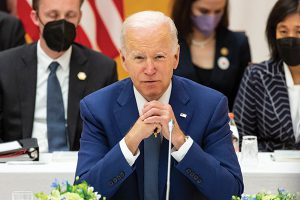Bloomberg
Russian President Vladimir Putin’s invasion of Ukraine has prompted a major rewrite of the Biden administration’s National Security Strategy, according to people familiar with the matter.
Early versions of the text, which is still being finalised, show how the administration’s priorities are shifting in response to Putin’s war in Ukraine and the burgeoning partnership between Beijing and Moscow.
The document’s publication, originally slated for this past January, was delayed after US officials came to believe that a Russian invasion of Ukraine was likely. It is now being substantially rewritten to reflect the ways the world has changed since the war began. It’s not yet clear when it will be published, and one of the people emphasized it may still undergo changes.
The new draft emphasises the importance of both Europe and Asia to US national security interests, a shift from an earlier version that focused more squarely on China and Asia. Rather than downplaying the importance of China, the document argues that events in Europe and Asia are intricately connected, according to the people.
Produced by every administration since Ronald Reagan’s presidency, the National Security Strategy provides one of the most important windows into the White House’s thinking on foreign policy issues.
The document, mandated by Congress, is designed to help lawmakers evaluate the administration’s budget priorities for national security; to clarify US relationships with allies, partners, and adversaries; and to ensure that representatives from across the US national security apparatus speak to foreign counterparts with one voice.
Spokespersons at the National Security Council didn’t respond to a request for comment. Secretary of State Antony Blinken’s recent speech on US policy towards China suggests one potential formulation for the way the document will weigh threats from Beijing and Moscow.
Russia, Blinken said, is a “clear and present threat,†whereas China is “the most serious long-term challenge to the international order.â€
The strategy is likely to argue that neither Russia’s challenge in Europe nor China’s in Asia can be dealt with in isolation.
 The Gulf Time Newspaper One of the finest business newspapers in the UAE brought to you by our professional writers and editors.
The Gulf Time Newspaper One of the finest business newspapers in the UAE brought to you by our professional writers and editors.
